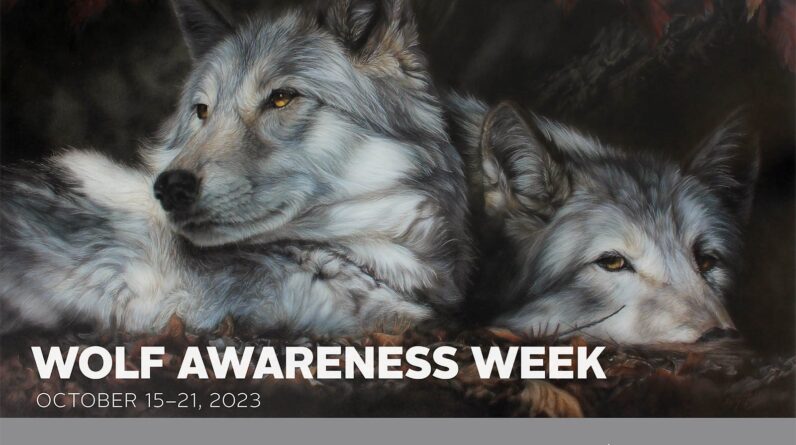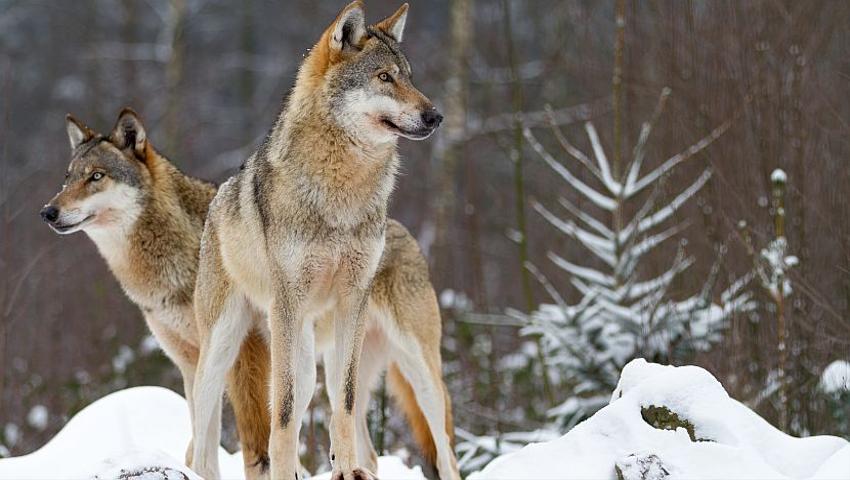
National Wolf Awareness Week is a dedicated event to promote awareness and understanding of wolves. During this week, various activities and educational programs are organized to highlight the importance of wolf conservation and debunk common misconceptions associated with these magnificent creatures.
In recent years, wolves have faced significant threats, including habitat loss and hunting. This week aims to dispel myths about wolves being dangerous and to emphasize their vital role in maintaining ecosystem balance. By raising awareness, we can encourage communities to support conservation efforts and ensure the long-term survival of these iconic animals.
Educational initiatives, such as public talks, workshops, and social media campaigns, provide opportunities to learn about wolves’ social structures, behavior, and ecological significance. Through promoting understanding and appreciation, National Wolf Awareness Week plays a crucial role in protecting and conserving this keystone species, contributing to our natural environment’s overall health and diversity.

Credit: www.thegreatprojects.com
The Importance Of National Wolf Awareness Week
The Importance of National Wolf Awareness Week cannot be overstated. This annual event is crucial in educating the public about the history and significance of wolves and the need for their conservation and protection.
Initially established in the United States in 1996, National Wolf Awareness Week serves as a platform to raise awareness about wolves’ vital role in our ecosystems. From controlling prey populations to maintaining biodiversity, these magnificent creatures are essential for maintaining ecological balance.
Through various initiatives and educational programs, National Wolf Awareness Week aims to dispel misconceptions and combat negative attitudes towards wolves. This event encourages individuals and communities to actively support efforts that protect and restore wolf populations by highlighting their benefit to the environment and emphasizing the importance of their conservation.
National Wolf Awareness Week is a rallying point for those passionate about wildlife conservation. By participating in activities such as wolf photography contests, educational presentations, and community outreach programs, people around the globe can contribute towards wolf conservation and ensure their continued existence in our shared natural heritage.
Understanding Wolf Behavior And Ecology
Understanding wolf behavior and ecology is crucial to appreciate their role in maintaining ecosystem balance. Wolves exhibit complex social structures and pack dynamics. They form tight-knit family units called packs, consisting of an alpha pair and their offspring. Pack members participate in cooperative hunting, territory defense, and raising pups.
Wolves significantly impact their environment by controlling prey populations, especially ungulates like deer and elk. They help balance predator and prey, preventing overgrazing and promoting healthier vegetation. Their presence affects the behavior and distribution of other species, influencing the structure and functioning of entire ecosystems.
Wolf feeding habits demonstrate their adaptability as carnivores. They primarily hunt large ungulates but can consume smaller prey and even scavenge when necessary. Successful hunting is facilitated by their excellent teamwork, stamina, and intelligence.
In summary, wolves are keystone species that regulate ecological processes. Understanding their behavior, social structure, feeding habits, and hunting strategies is vital for effective wildlife and habitat management.
Threats To Wolf Conservation
National Wolf Awareness Week brings attention to the various threats facing wolf conservation. One major challenge is habitat loss and fragmentation, which significantly impact wolf populations. As human populations expand and land is developed for agriculture, urbanization, and other purposes, wolf habitats are being destroyed or divided into smaller, isolated patches.
This fragmentation disrupts their natural patterns of movement, making it difficult for them to find adequate food and mates, which can result in lower reproduction rates and genetic diversity.
Another issue faced by wolf conservation efforts is conflicts between wolves and livestock. Wolves sometimes prey on livestock, especially in areas where their natural prey is scarce. This leads to conflicts with farmers and ranchers, who may view wolves as a threat to their livelihoods and may resort to lethal control methods.
Political and legislative challenges also hinder wolf conservation. Policies and regulations can vary among different jurisdictions, and public opinion on wolf management can be divided. This can make it difficult to implement effective conservation measures, as decisions are often influenced by political and economic interests rather than scientific evidence and the long-term viability of wolf populations.
Successful Wolf Recovery And Conservation Programs
National Wolf Awareness Week aims to bring attention to the successful recovery and conservation programs that have been instrumental in reintroducing wolf populations. These programs have been made possible through collaborative efforts between government agencies and conservation organizations, highlighting the importance of partnerships in preserving the wolf species.
Community support plays a significant role in the success of wolf recovery programs. Local communities have been actively involved in education, advocacy, and habitat restoration initiatives. Their participation helps to create a sustainable environment for wolves to thrive.
By focusing on successful reintroduction efforts and highlighting the importance of community support, National Wolf Awareness Week raises awareness about the positive impact of conservation programs. It encourages individuals and communities to become involved in protecting and preserving the wolf species for future generations.
Myths And Misconceptions About Wolves
National Wolf Awareness Week is an important event that aims to educate people about the myths and misconceptions surrounding wolves. It is vital to address the negative stereotypes and fear-driven narratives that have been perpetuated about these majestic creatures.
One common misconception is that wolves pose a threat to humans. However, the truth is that wolf-human interactions are extremely rare, and wolves typically avoid contact with humans. They are naturally shy and elusive animals that prefer avoiding human settlements.
Another myth surrounding wolves is that they are ruthless predators that kill for pleasure. In reality, wolves are apex predators that play a crucial role in maintaining ecosystem balance. They primarily hunt prey animals to survive and feed their packs.
Debunking these misconceptions is essential for fostering a greater understanding and appreciation of wolves. By promoting accurate information, we can create a more harmonious relationship between humans and these incredible creatures.
Public Involvement In Wolf Conservation
National Wolf Awareness Week is an important event that aims to raise awareness about the conservation efforts of wolves. One way individuals can get involved is by supporting local organizations and initiatives. Donating funds or volunteering their time can greatly help in the conservation efforts.
Another way to contribute is through advocacy and education. Individuals can participate in campaigns, sign petitions, or educate others about the importance of wolf conservation. By spreading awareness and encouraging others to take action, individuals can make a significant impact on wolf conservation.
It’s essential to remember that every effort counts, no matter how small it may seem. Together, we can protect and preserve these magnificent creatures for future generations.
Engaging With Wolf Enthusiasts And Organizations
National Wolf Awareness Week is a great opportunity to engage with the wolf enthusiast community and connect with various organizations dedicated to wolf conservation. The internet provides many online resources and platforms for wolf enthusiasts to join discussions, share experiences, and learn more about these magnificent creatures. Online forums, social media groups, and websites specifically focused on wolf-related topics can help you connect with fellow enthusiasts who share your passion and interest in wolves.
Moreover, you can support and collaborate with wolf conservation organizations during National Wolf Awareness Week. These organizations work tirelessly to protect wolves and their habitats through various initiatives, campaigns, and projects. By donating to these organizations, volunteering your time, or participating in awareness events, you can actively contribute to wolf conservation efforts. Additionally, collaborating with these organizations allows you to leverage their expertise and network to make a greater impact in advocating for wolves.
Inspiring Action And Advocacy For Wolves
National Wolf Awareness Week provides a valuable opportunity to create awareness and advocate for wolves. To make the most impact, consider implementing creative strategies that can capture attention and engage a broad audience.
Organizing Local Events And Initiatives
One effective way to raise awareness is by organizing local events and initiatives. This can include educational presentations, workshops, and guided tours of wolf habitats. Encouraging participation in wolf-themed art contests or photography competitions can also help showcase the beauty and importance of these magnificent creatures.
Utilizing Social Media For Broad Outreach And Education
Social media platforms are powerful for reaching a wide audience during National Wolf Awareness Week. Share captivating images, educational videos, and engaging infographics to spark curiosity and inspire people to take action. Encourage users to share their stories, artwork, or experiences with wolves, fostering a sense of community and connection.
Collaboration With Conservation Organizations
Collaborating with local and national conservation organizations can amplify efforts to raise wolf awareness. Partnering with these organizations can provide access to additional resources, expertise, and opportunities for joint campaigns. The impact can be greater by pooling resources and networks, inspiring more people to support wolf conservation efforts.
Frequently Asked Questions Of National Wolf Awareness Week
Is There A National Wolf Day?
Yes, there is a National Wolf Day. It is celebrated on April 11th each year.
What Is Wolf Week?
Wolf Week is an annual event celebrating and raising awareness about the importance of wolves in ecosystems. It includes educational activities and initiatives to promote conservation efforts and dispel myths about these magnificent creatures.
What Are The Benefits Of The Grey Wolf?
The grey wolf offers several benefits, including its role in balancing ecosystems, hunting prey, and indicating healthy habitats.
What Is The Least Concern Wolf?
The least concern wolf is a classification by the International Union for Conservation of Nature (IUCN), indicating that a wolf species is widespread and not currently at risk of extinction.
Conclusion
To conclude, National Wolf Awareness Week serves as a crucial reminder of the importance of these magnificent creatures. By raising awareness about their vital role in maintaining ecosystem balance, we can work towards conserving their habitats and protecting their future.
Through education, advocacy, and strong efforts, we can ensure the survival of these remarkable animals and benefit the world we all share. Let’s celebrate and protect our wolves!





